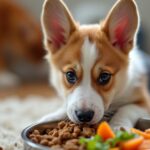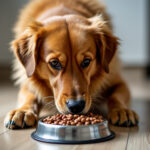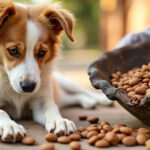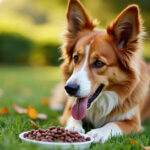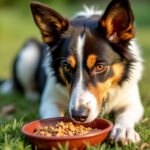German Shepherd puppies thrive on a diet that meets their unique nutritional requirements. A balanced mix of high-quality proteins, fats, essential vitamins, and controlled calories is vital. Choosing the right puppy food, especially those for large breeds, mitigates growth issues and supports robust bone and muscle development.
Table of Contents
ToggleKey Takeaways:
- German Shepherd puppies benefit from a diet with at least 22% protein. Sources like chicken, beef, and lamb are excellent choices for supporting their growth.
- They need essential vitamins such as A, B complex, D, and E for healthy muscle and bone development.
- Puppy foods specifically for large breeds help avoid issues like hip dysplasia by offering nutrients in proper ratios.
- Look for high-quality ingredients, including human-grade protein and chelated minerals, to boost digestibility and nutrient absorption.
- Controlling portions and watching calorie intake prevent obesity and skeletal problems in rapidly growing GSD puppies.
The Essential Nutritional Needs of German Shepherd Puppies
German Shepherd puppies need significant amounts of protein, fat, and calories to fuel their rapid growth. With a diet that includes at least 22% protein from top-quality sources like chicken, beef, and lamb, these puppies can thrive. Essential vitamins such as A, B-1, B-2, B-6, B-12, D, and E play a vital role in supporting muscle and bone growth.
To meet energy demands and support a healthy digestive system, it’s important for their diet to include carbohydrates and fiber. A balanced diet ensures these puppies have the energy needed for their active lifestyle while promoting proper development. Paying attention to calorie control is crucial as well, to prevent excessive weight gain that could stress developing joints.
Exploring the Best Puppy Foods for German Shepherds
Large breed puppy-specific foods play a crucial role in preventing growth issues like hip dysplasia in German Shepherd puppies. The right food ensures healthy development by supplying essential nutrients in precise ratios.
Consider these top-recommended brands for your German Shepherd puppy:
- Orijen Puppy Large: This food is rich in proteins and Omega fatty acids, promoting muscle growth and coat health.
- Holistic Select Puppy Lamb Meal: Offers probiotics and antioxidants, supporting digestion and immune health.
- VICTOR Pro-Active Puppy Formula: Features a balanced blend of proteins and fats, aiding in bone development and overall energy.
- Earthborn Holistic Grain-free Puppy Food: Suits sensitive stomachs while still providing essential nutrients for large breeds.
Each option blends quality ingredients designed specifically for large breeds, ensuring a healthy start for your puppy’s life.
Prioritizing High-Quality Ingredients
High-quality protein sources such as chicken and lamb play a crucial role in muscle maintenance for GSD puppies. Opting for human-grade ingredients ensures better digestibility and higher nutritional value. This translates to improved energy levels and overall growth.
Incorporating chelated minerals into your puppy’s diet makes nutrient absorption more efficient, supporting strong bone development and immune function. Omega 3 and 6 fatty acids are essential for promoting skin and coat health, giving your puppy a sleek, shiny appearance.
When selecting food, remember these key components:
- High-quality protein sources: Choose chicken or lamb for muscle support.
- Human-grade ingredients: Ensures superior digestibility and nutrition.
- Chelated minerals: Enhances nutrient uptake.
- Omega 3 and 6 fatty acids: For optimum skin and coat condition.
Such a comprehensive approach ensures that your pup receives the best for their growth and vitality.
Balancing Portion Control and Feeding Guidelines
Precise portion control is crucial for German Shepherd (GSD) puppies due to their rapid growth and active nature. You should start by following the feeding guidelines outlined on the puppy food labels, adjusting portions based on your puppy’s age, weight, and activity level. These guidelines offer a solid foundation, though a personalized approach will make a significant difference.
Overfeeding not only packs on unnecessary pounds but also poses serious health risks, such as obesity and skeletal problems. Fast-growing breeds like German Shepherds are especially susceptible to joint issues. Carefully monitor calorie intake to keep your puppy in optimal condition and help prevent conditions like hip dysplasia. Regular check-ups with the vet can also support this cause.
Keep an eye on:
- Age and weight of the puppy. Adjust food portions as your puppy grows.
- Activity level. More energetic pups may require a slight increase in calories.
- Signs of overfeeding like rapid weight gain. It could necessitate portion adjustments.
Calorie monitoring is vital. It’s more than just reading labels; it’s about understanding your puppy’s unique needs. Implementing these guidelines will promote healthier growth in your GSD puppy.
When navigating the world of nutrition for your German Shepherd puppy, it’s helpful to explore the best dog food options available. This ensures that you provide balanced meals that cater specifically to the breed’s nutritional requirements. Selecting the right food not only helps in meeting their energy needs but also aids in preventing future health issues by supporting proper growth and development.
For those seeking thorough insights and expert selections, visiting resources that discuss expert picks for shepherd puppies can be incredibly beneficial. These curated recommendations offer a lens into the most nutritious choices, tailored to shepherds’ unique needs. Whether you’re a new pet parent or have years of experience, ensuring your puppy gets off to a healthy start is paramount.
Beyond just food selection, understanding the overall best nutrition options for German Shepherds is crucial. This involves researching ingredients and feeding practices that support a robust immune system, healthy skin, and strong bones. By turning to trusted sources, you’re able to make informed decisions that benefit your GSD’s health both now and in the future.
Sources:
Frequently Asked Questions
What essential nutrients do German Shepherd puppies need?
German Shepherd puppies need a diet rich in protein, fat, and calories. Essential vitamins such as A, B-1, B-2, B-6, B-12, D, and E are also vital for their growth.
Why is it important to choose large breed puppy-specific foods for German Shepherds?
Large breed puppy-specific foods help prevent growth issues like hip dysplasia by supplying essential nutrients in precise ratios needed for healthy development.
Which are some recommended puppy food brands for German Shepherds?
Some recommended brands include Orijen Puppy Large, Holistic Select Puppy Lamb Meal, VICTOR Pro-Active Puppy Formula, and Earthborn Holistic Grain-free Puppy Food.
What are the benefits of high-quality protein sources for GSD puppies?
High-quality protein sources, like chicken and lamb, play a crucial role in muscle maintenance and overall growth for German Shepherd puppies.
Why is portion control important for German Shepherd puppies?
Portion control is important to prevent overfeeding, which can lead to obesity and skeletal problems like hip dysplasia. It helps keep German Shepherd puppies in optimal condition.
How can I adjust food portions for my German Shepherd puppy?
Adjust food portions based on the puppy’s age, weight, and activity level. Follow the feeding guidelines on the food labels, and personalize them as needed.
